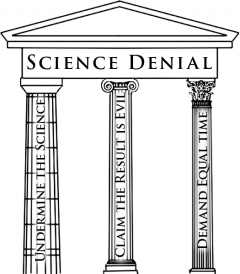The National Center for Science Education defends climate science in high schools
Posted on 23 January 2012 by John Cook
The war on climate science is waged on many fronts, with one growing element being high schools. One Washington school board placed a moratorium on showing "An Inconvenient Truth" in classrooms. A California school board has voted to include "multiple perspectives" on climate science. Another movement in Colorado gathered 700 signatures asking to remove climate science from curriculums. These are all manifestations of a growing movement to inject denial of human-caused global warming into school curriculums.
Stepping into the front line to defend climate science is the National Center for Science Education. The NCSE have a long history of defending evolution science in the classroom. Now they've launched their Climate Change Initiative, to defend and support the teaching of climate science. NCSE's executive director Eugenie C. Scott explains:
"We consider climate change a critical issue in our own mission to protect the integrity of science education. Climate affects everyone, and the decisions we make today will affect generations to come. We need to teach kids now about the realities of global warming and climate change, so that they're prepared to make informed, intelligent decisions in the future."
The NCSE website now features a climate section providing a number of useful resources for teachers such as:
- Climate Change 101 answers 4 central questions about climate change
- Teaching About Climate Change provides resources for teaching and learning about climate change
- Climate Change Denial expose the techniques of science denial, shining a light on the 3 pillars of climate change denial
- Taking Action provides tips and resources on how you can defend and support climate change education
Most importantly, the NCSE are on hand to support teachers who are under attack and need assistance. If you support the defence of climate science, I strongly recommend supporting the NCSE - you can donate or become a member (I just signed up).































 Arguments
Arguments
































- Prior to the increase in temperatures, this pathogen existed but did not extinguish the species for many tens of thousands (millions? tens of millions?) of years
- Temperature changes towards the optimum for this pathogen made outbreaks more frequent and virulent.
- The species is now extinct.
So climate change --> pathogen outbreaks --> extinction. Are you also claiming that in murderer --> gun --> murder, the murderer is an indirect, exacerbating factor?